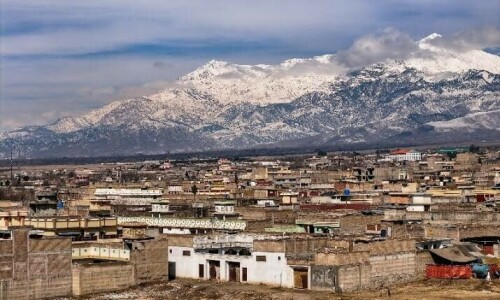ISLAMABAD: At least four major public sector universities in the twin cities do not allow students to access social media websites on campus Internet and Wi-Fi networks.
Fatima Jinnah Women University (FJWU), the International Islamic University (IIU), the Pir Mehr Ali Shah University of Arid Agriculture and the Comsats Institute of Information Technology – one of the country’s leading institutes for IT – are among those who have blocked access to the social networking sites Facebook and Twitter.
A Dawn survey has revealed that both sites have been blocked at FJWU since at least 2011, while IIU implemented the ban three months ago. Arid University introduced the measure in June while Comsats, the latest entrant to this club, blocked access in July.
Officials from all the institutions claim that the sites were blocked after the administration received complaints from both students and teachers.
Curbs on Facebook, Twitter prompted by teachers who complain students don’t pay attention in class
IIU Deputy Director IT Shakeel Shah told Dawn: “We blocked access to social media websites a few months ago because teachers came to us and complained that students were too preoccupied surfing the web and did not take adequate interest in lectures. “They use Twitter and Facebook during university hours, which disrupts the classroom environment,” he said.
A member of the Comsats faculty told Dawn the institute had restricted access to social networking sites in view of complaints by young women. “They complained of harassment by young men and fellow students and accused of posting insulting comments,” the faculty member said.
Comsats spokesperson Shahbaz Ahmed said the varsity had implemented the ban in early July “due to various reasons”. However, he said, the ban may be lifted very soon.
A representative for FJWU told Dawn the university had restricted access to social media sites on campus servers for some years now.
This decision, they said, was taken in the students’ own interest to provide them with a “safe and secure environment”. But the official admitted that despite the ban, several students continued to access Facebook and Twitter via proxy websites or on their own mobile devices.
Failed experiment
Blocking access to social media in a bid to decrease distractions and get students to concentrate on academics is the method of choice for several public and private educational institutes in the country. However, this is a failed experiment, as was proven by the Harrisburg University of Science and Technology in Pennsylvania.
The US college, in a bid to empirically measure the impact of banning social media on students’ performance, completely blocked access to social media and instant messaging platforms for one week in 2010.
However, before the week was up, observers declared the experiment a failure, as some students “went to great lengths to foil the university's attempts to block them from accessing the sites on campus”.
Regressive attitude
Students at the universities in question, also complain that their administrations are adopting a regressive approach.
“I would use Facebook to keep in touch with classmates online and we had Facebook groups of old students, where everyone shared notes, study tips and other useful resources,” a girl from IIU told Dawn.
Bilal, from the same university, said: “This is tantamount to denial from access to information and students are being deprived of a valuable knowledge-sharing resource”.
Those who have their own mobile devices can still access Facebook, Twitter and other instant messaging and social networking sites. Other, more resourceful students, especially at the IT-centric Comsats, have worked out how to bypass the bloackade.
Hasees Ahmed, an undergraduate student at the institute, told Dawn that the more tech-savvy students had no problems getting around the filtering and can easily log onto social media, even on campus Internet.
This regressive attitude is also embarrassing for students. “When we tell our friends from other institutions that Facebook is blocked on our campus, they ask us what kind of IT university is this,” a young woman studying computer science told Dawn.
An FJWU student said that proxy websites were a staple among the students. “Even if they block one proxy site, we can find ten others,” she said.
“I don’t know why they did it. I heard that a certain retired brigadier took the decision,” the student said.
Published in Dawn, Aug 3rd, 2014













































